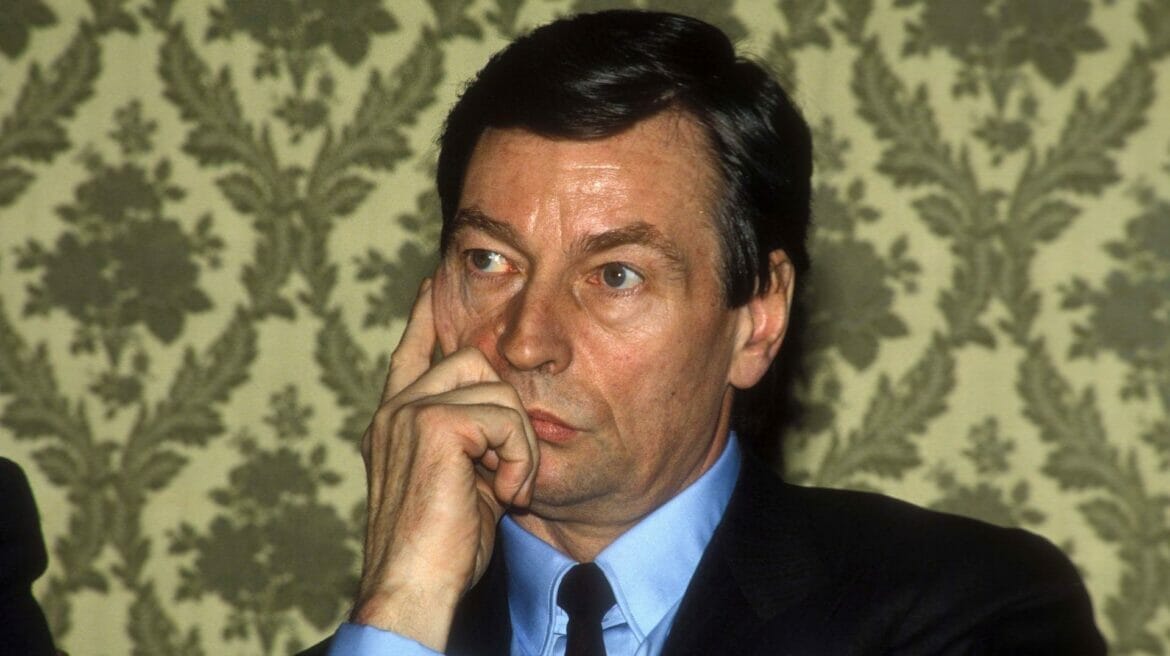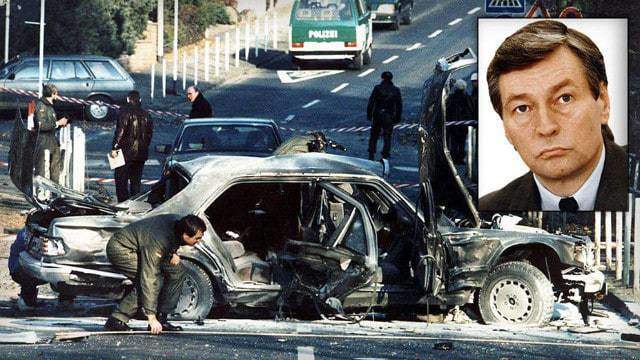

Germany´s Most Powerful Manager Broke Taboos
Ph.D. Alfred Herrhausen (1930 – 1989) was a leader way ahead of his time. He was a German banker, and he polarized the German nation as well as the banking sector. In his lifetime, he had numerous critics. He was considered arrogant and cold—nothing could be farther away from the truth. Much has been said about his achievements as a business person. Several publications focus on chronological descriptions of the career of this brave man.
I am inviting you to learn more about the fascinating personality of Dr. Alfred Herrhausen and the leadership skills that made him so successful.
While there are many managers I respect for their achievements, there is (or was) only one manager I admire, look up to and consider a role model. Even though Dr. Alfred Herrhausen, who was born in 1930, was assassinated by a terrorist organization, RAF (Red Army Faction terrorized Germany from 1971 to 1993) already in 1989, his style of leadership makes him someone we can learn from until now. Come with me on a journey through the life of Alfred Herrhausen.
What made Alfred Herrhausen a Myth?
- How could this philosophy lover, who was not even a banker, become the most successful manager of Germany?
- Can dividends and decency go together?
Yes, if you are Alfred Herrhausen, dividends and decency can go together!
The former boss of the West LB (another German bank), Ludwig Poullain, put it like this in his angry speech against the moral decline of the finance industry: “It has always been uncomfortable to have an opinion. It can get even more uncomfortable if you also express your opinion. He (A.H.) is the last of our industry who has the courage to do so.”
“We must say what we think. We must do what we say. We must also be what we do.”
Alfred Herrhausen
Better known in the US is Josef Ackermann, another rather polarizing ex-boss of the Deutsche Bank. He named Alfred Herrhausen as his role model when he was appointed in 2002. That said, the self-service mentality, shortsightedness and naked greed of his successors did not belong to Alfred Herrhausen´s repertoire. He strongly opposed it.
After Herrhausen, what is known as the “peanuts* people phase” of bank managers began. The reputation of banks and their managers is on a downward spiral ever since.
* In 1994, Hilmar Kopper (ex-Deutsche Bank Boss) called unpaid craftsman bills (Jürgen Schneider collapse) amounting to millions of dollars “peanuts”. Not only craftsmen, who had to close their businesses because of these “peanuts”, expressed their incomprehension with this terminology. Meanwhile, “peanuts” has become a cult word.
His successor, Breuer, was involved in a scandalous trial (or better, trial after trial) after publicly questioning the creditworthiness of the Kirch Group on Bloomberg TV. A few months later, the Kirch Group went bankrupt. The court testimonies of bank executives then also lead to criminal investigations. Deutsche Bank agreed to pay $1.27 billion.

16 years after the death of Alfred Herrhausen the German president at the time, Schroeder, told Ackermann to revisit Herrhausens´s philosophy. Ackerman had just reported record winnings together with a plan for massive job cuts.
Herrhausen once said: Businesses make the most mistakes in good times. Not when times are bad.
Alfred Herrhausen stood for transparency, morale, and integrity! He played in a league of his own. He was the last bank manager the people described as “honest” and “integer”.
Who was the Master of Money, Alfred Herrhausen?
Born in 1930 in Essen, Germany, as the son of an Engineer, For a short period, Alfred Herrhausen attended a Nazi school as a highly gifted student during World War II. Later, he said that these three years did not harm him but provided him with love for hard work, team spirit, discipline, and diligence.
Alfred Herrhausen expressed his love for his fatherland. At the same time, he kept reminding the Germans of the “guilt”.
His first love was philosophy. He never lost this love. When he did not find an appropriate place of study in the aftermath of World War II, he went for an MBA degree and then obtained his Ph.D.
He started his career in the gas sector and changed to the electricity sector in 1955. His brilliance and self-confident appearance brought him to the Deutsche Bank, where he became deputy Member of the Board in 1970.
Not only was he the youngest manager to become a Board Member, a lateral entrance like this was unheard of. During his first years at Deutsche Bank, many mocked him as “the electrician” internally. Equipped with the self-esteem of a Lord, Herrhausen continued his road to success. Soon those who mocked him would feel intimidated by his sharp mind, his power to execute and his superior intellect.
His public commitment to morals and ethics was unusual and brought him plenty of enemies within the Deutsche Bank. Keep in mind, this was in the 70s / 80s, long before “social responsibility” “soft skills” and such were trending.
The Power of Alfred Herrhausen

- He became Spokesman of the Management Board of the Deutsche Bank in 1985 and Sole Executive Chairman in 1988.
- He held supervisory board positions at Daimler-Benz, Continental, and Philip Holzman (to name only a few)
- He was an economic counselor to and friend of the German president of that time, Helmut Kohl,
He has been considered Germany's most capable authority in economics. His viewpoint on power was:“You also must want power”.
Asked in an interview regarding the power of Germany's largest bank, he said:
“Sure, we have power. The question is not if we have or don't have power. The question is how we handle it and whether we use it responsibly or not.”
What made that statement so remarkable was not just that it implies that Herrhausen suggests the responsible use of power. Oh, no.
Herrhausen was also an advisor to several leading politicians.
Herrhausen understood his position as a chance to take on social and economic responsibility. To many that made him dubious and alien. He was different from other bank managers.
"Power", said Herrhausen, in 1976, during an internal meeting, "does not begin with the exertion of influence, but with the possibility for it."
Until Herrhausen, bankers did not admit or talk about the power of banks. It was Herrhausen, the most powerful banker in the history of Germany, who broke that taboo.
Achievements for the Deutsche Bank
With his mindset, he changed the banking industry and the Deutsche Bank. ”We want to be a bank with a European branch network and a global player on the international market.” was his vision at the end of the 80ties. Three weeks before his death, he acquired the British Morgan Grenfell investment bank. So far, investment banking in an international context was mainly the domain of Japanese and US American banks. It was the largest acquisition since 1945. Against all internal resistance, Herrhausen pushed the globalization of the bank for the ability to compete internationally. “Our customer is globalizing”, Herrhausen said, “we will go with him.”Herrhausen transformed the bank into the German market leader. Herrhausen made the Deutsche Bank a global player. A lot of the success of the Deutsche Bank is based on Herrhausen´s concepts and owed to him.
Since Herrhausen´s death, the bank has moved away from social responsibility and embraced a mephistophelian way. Everyone takes what he can get. Investment bankers act like mercenaries. Not led by loyalty to the company, but bonuses. Mercenaries move on when somebody else pays more.
An ex-employee said, “Herrhausen also saw the need for paying good bankers good money to keep them. But he would have taken measures to control the danger of the dependency”.
Herrhausen's speech in the last hours of his work is of depressing actuality:
“Be aware: Never before has humankind faced bigger challenges: … the strengthening of the Pacific Basin Region, including China and India, the north-south problematic, the technological revolution, the environmental challenges. All of that at the same time. For active people who want to influence, this is the joy to live. I am wishing you this joy.“
Was A.H. arrogant and cold?
Alfred Herrhausen was interested in people. He had a lot of self-confidence. A.H. was not arrogant. Self-confident people are never arrogant. Arrogance is a sign of insecurity. Alfred Herrhausen was not insecure.
Alfred Herrhausen was strong, sincere, honest, straight, disciplined, goal oriented, highly intelligent, analytic and of high morale. He was led more by his head than his emotions when it came to business. Believe it or not—he was also humble.
He was consequent, also, in his personal life. When he got divorced, he offered to step back from his position (he married again later).
The combination of a high level of self-control, self-discipline and a sharp mind has been mistaken for arrogance by some.
In 1982, Herrhausen met the 30 years younger university student, Tanja Langer at a talk show. She had been invited as an advocate for the generation “no future”. Politically on the far left, she told him off after the show. Her criticism and her perspective on politics and economics amazed him, and he asked her to write to him.
This was the beginning of a special friendship that lasted until the end. Letters, phone, calls, and meetings for 7 years.
Herrhausen's wife, Traudl, invited Tanja for the funeral. Later, she gave Tanja the letters back that she had written to Alfred Herrhausen. He had kept them all. She reflected on the friendship in her book "Der Tag ist hell, ich schreibe dir" in 2012.
Alfred Herrhausen could not deal well with idiots. Once he analyzed a problem, he wanted to see solutions and results.
“The world is not a talking shop. Decisions have to be made and plans have to be executed.”
He could analyze even the most complex problems within seconds. He thought things through. I get how that could have been intimidating for colleagues.
A former Deutsche Bank colleague said about Herrhausen: “He was an intellectual snob that made us feel inferior.”
If he had not been killed, Alfred Herrhausen would have had rough times. As mentioned before, he had many enemies. Inside and outside the bank.
As the most powerful manager, Europe's left parties, and terrorist organizations had him on the radar. Many of his colleagues considered him, and his revolutionary and sometimes radical ideas, dubious. Especially, his engagement for debt forgiveness for developing countries made him the sworn enemy of many other bank managers on an international level. His commitment to transparency and morale was fiercely resisted.
Until this day, his speech at the annual shareholder meeting of May 1989 is being quoted:
“The German Bank cannot just make good deals. Because of our size, our position, and our authority, we have to take on social and economic responsibility. We have to accept an ethical obligation. Action has to be founded on attitude.”
While many younger employees of the Deutsche Bank celebrated internal speeches as “A party of thinking”, a lot of the older employees felt offended. Especially, a speech about the right and the wrong way of thinking was something many older colleagues felt offended by. Alfred Herrhausen was straight and direct. He was not after making “old bankers” feel comfortable.
That was probably his biggest weakness. He did not form political alliances. He thought if something makes sense, people will buy into it. Not only that, but he overlooked that many of his colleagues did not consider the world their playfield, but were seeking only their advantage.
He was planning radical changes and restructuring of the Deutsche Bank, and as always Change Management is a big issue. Middle and lower management feared for their positions, they feared change, and with wordings like “Unnecessary fuss of the naysayers”, Herrhausen did not help that.
Again, Herrhausen´s assumption was that a logical thought with a logical conclusion that made sense would convince any opponents. He overlooked the egos and personal agendas.
The most powerful manager of Germany was not power hungry. He aimed to use his position to the benefit of the company, the country, and the people. The resistance against his revolutionary and drastic plans for repositioning and restructuring the German Bank to make them fit to compete internationally was getting stronger.
The great one has made the good ones his enemies.
But his motto was: “Accepting challenges is the joy of life.”
Leadership style
The thought leader
A lover of philosophy and highly intellectual and intelligent, Alfred Herrhausen stood for social responsibility. He was as passionate about pursuing business goals as he was about developing social causes.
He opposed all restrictions on free thought. Time and time again, he thought aloud about issues that appealed to very few of his contemporaries. These ranged from debt forgiveness for developing countries, transparency, working for the community, personal initiative and responsibility, right through to the question of how large organizations could remain open, authentic and dynamic. According to Herrhausen, future uncertainty can only be faced with the greatest possible degree of spiritual freedom and flexibility. He analyzed the status quo incisively, with a view to generating ideas about the shape of the world to come. Herrhausen is quoted as saying,
“Most time is lost because people do not think things through to the very end”.
“Most time is lost because people do not think things through to the very end”.
Social Responsibility
Debt relief for developing countries Alfred Herrhausen was the first German banker who pledged for debt forgiveness for developing countries. After hearing from the Mexican president at the time, Miguel de la Madrid Hurtado, at a Worldbank conference in Washington about the catastrophic economic situation, he developed a plan for partial debt forgiveness for poor countries. The German Bank was the first bank to lower the debt of a poor country without having to do so.
Alfred Herrhausen believed that solvency problems are not solved by increasing debt. He saw partial debt-forgiveness as a strategy that helps the investors too eventually. To qualify for debt-relief, so the plan goes, the countries had to agree to economic reforms (i.e., environmental protection) that would also stabilize the countries.
Herrhausen did not inform anyone before his speech at the Worldbank Conference. The German bank managers were as shocked as the rest of the finance world.
The international banking world was even outraged. The boss of the Commerzbank, Walter Seipp, publicly accused A.H. of a lack of solidarity.
Herrhausen´s response was, “The German Bank does not need lessons in solidarity. Moreover, solidarity cannot mean to stop thinking”.
After Herrhausen´s death, his successor - Hilmar Kopper (Mr. Peanut)—labeled the idea of debt relief for poor countries an “intellectual remark”. The plan died with Alfred Herrhausen. Or did Herrhausen have to die because of the plan?
How Alfred Herrhausen ticked
6 weeks before the terrorist attack, Alfred Herrhausen gave a remarkable interview. As you might have noticed already, it is very difficult for me to translate his words as he is using a very rich language. Not complicated, but a “flowery” beautiful language that reminds me a bit of Herman Hesse.
I picked out a few sentences I thought were good examples to get an insight into the mind of Alfred Herrhausen.
Interviewer (I): If I would give you 50 Deutsche Mark and half an hour of time on top, what would you do with it?
Alfred Herrhausen (AH): I would buy books. And in the remaining time, I would look into them.
When asked for titles of books he would buy with the money, he stated that he did not want to name titles, but that he loved books from philosophers.
I: At first, you wanted to become a philosopher
AH: I wanted to study philosophy. Becoming a philosopher is maybe a bit too ambitious and sophisticated.
The assassination of Alfred Herrhausen
According to a statement of his wife, Alfred Herrhausen feared terrorist attacks since the assassination of Martin Schleyer. In his nightstand, he kept a letter that stated that in case of a hostage and blackmail situation, neither Germany nor the Deutsche Bank should give in to any ransom or other demands.
Herrhausen was one of the best-protected persons of the nation. Not the armor of his Mercedes-Benz, and not the bodyguards driving in front and behind him, could save him when the bomb exploded on November 30, 1989. He bleeds to death at the crime scene.

The New York Times reported about this tragedy on December 1st. You can read the article HERE
The RAF admitted to the assassination of the most powerful manager of Europe, but the case has not been solved until now. Because of the high level of sophistication, many doubt that the RAF could have done it—at least without help.
I will not engage in any theories, as I do not have the faintest clue what really happened, and it is the nature of conspiracy theory fans to have convincing arguments. CIA, Stasi - there is no proof for either theory. All I know is that all evidence strongly suggests that the RAF did not kill Herrhausen.
Evidence aside—Even though Herrhausen held more power in his hands than any other manager before him. He stood for “the right” things. It does not seem to be the right victim profile for the far-left terrorist organization.
Who killed Alfred Herrhausen?
The two theories most people believe:
1. Maybe Alfred Herrhausen´s debt-relief suggestion in front of the Worldbank was just a stunt. While the German Bank was safe, many unstable US American banks would have been ruined. Therefore, Herrhausen would have been able to acquire US banks cheap he could otherwise not afford. Their only other option would have been to look like greedy jerks in the public eye.
2. Only 3 days before the murder, Herrhausen purchased a British investment bank. So far, US and Japanese banks ruled the game of international investment banking. This acquisition enabled the German Bank to enter the game. The German Bank is a fierce competitor in every game they play.
The thing about Alfred Herrhausen is: He was honest. He did what he said he would, and he was what he did.
Herrhausen saw his responsibility in doing things that are good for his company, the country, the people, and the word/environment. But he was also one of the most gifted, goal oriented, successful managers.
Let's just have a look at the implications of debt-relief for poor countries. What would be the effects?
Alfred Herrhausen wanted to get into the investment banking game, and he wanted to globalize the Deutsche Bank.
- The suggested reform for debt relief included Rain Forest preservation. Good for the world.
- Other reforms proposed would help poor countries stabilize their finances. Good for the people.
- While the Deutsche Bank was pretty much safe, many of the unstable US banks would have been ruined by the debt-relief plan, even if they would just have granted minor relief. Herrhausen could have bought US banks at discount prices. Good for the company and as a result...
- An even stronger Deutsche Bank helps the country, Germany. Good for the country.
Let's just say. If that had been a stunt of Herrhausen (or better an enhanced agenda) it would have been a genius plan to once more do the impossible: Insane profits while helping the environment, the people, the world, and his company.
What is interesting is the reaction of ex-Deutsche Bank boss Josef Ackermann. When asked if he could not just reintroduce the topic “debt-relief for poor countries” he said: “I believe I would end like Herr Herrhausen then”.
Maybe, Herr Ackermann does not believe the far left terrorist organization with limited technical skills killed Herrhausen. One could think his statement implies that. Or we just watched a failed attempt at walking the line between tasteless and funny. The other alternative is that he was really just talking about Herrhausen being isolated and under attack for his proposal.
While more people believe in an involvement of the CIA than in RAF being the murderer, the case is not solved.
All I know is that on November 30th of 1989 an exceptional leader and human being died.
"Die Wahrheit ist dem Menschen zumutbar" (people can handle the truth)
is engraved in the two basalt pillars at his memory.
Books about Alfred Herrhausen: Books
